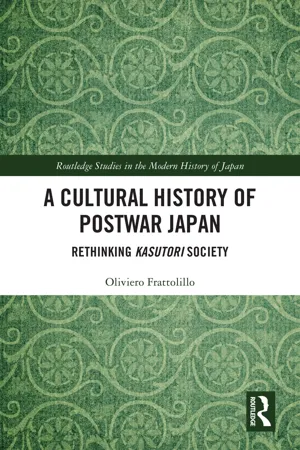
- 198 pages
- English
- ePUB (mobile friendly)
- Available on iOS & Android
About this book
This book is a political and cultural history of the early postwar Japan aiming at exploring how the perception and cultural values of everyday life in the country changed along with the rise of the kasutori culture. Such a process was closely tied with both a refusal of the samurai culture and the interwar debate on modernity, and it resulted in a decadent way of life, exemplified by intellectuals such as Sakaguchi Ango.
It depicts a short-lived radical cultural and social alternative, one that forced people to rethink their relationship to the kokutai, modernity, social roles, daily practices, and the production of knowledge. The subjectivity and daily practices in those years were more important in shaping the cultural identities of the Japanese than the new public ideology of the nation. This challenges some Euro-American historical notions that the new private sphere has emerged in Japan as an effect of the country's Americanization, rather than from within it. This work not only looks at the immediate aftermath of WWII from the perspective of Japan, but also tries to rethink Westernization in the light of its global appropriation.
This volume is addressed to specialists of Japanese or Asian history, but it will also attract historians of the United States and readers from political and intellectual history, cultural studies, and historiography in general.
Frequently asked questions
- Essential is ideal for learners and professionals who enjoy exploring a wide range of subjects. Access the Essential Library with 800,000+ trusted titles and best-sellers across business, personal growth, and the humanities. Includes unlimited reading time and Standard Read Aloud voice.
- Complete: Perfect for advanced learners and researchers needing full, unrestricted access. Unlock 1.4M+ books across hundreds of subjects, including academic and specialized titles. The Complete Plan also includes advanced features like Premium Read Aloud and Research Assistant.
Please note we cannot support devices running on iOS 13 and Android 7 or earlier. Learn more about using the app.
Information
Table of contents
- Cover
- Half Title
- Endorsement Page
- Series Page
- Title Page
- Copyright Page
- Dedication
- Table of Contents
- Foreword
- Acknowledgments
- Introduction
- 1 Japan’s modern/modernized subjectivity
- 2 Americanized Japanese? Questioning the unquestionable
- 3 To forget or not forget? Japan as the place of desire
- 4 Portraits of decadence in “Moonshine Japan”
- Epilogue: could you call us human and humanist, please?
- Bibliography
- Index